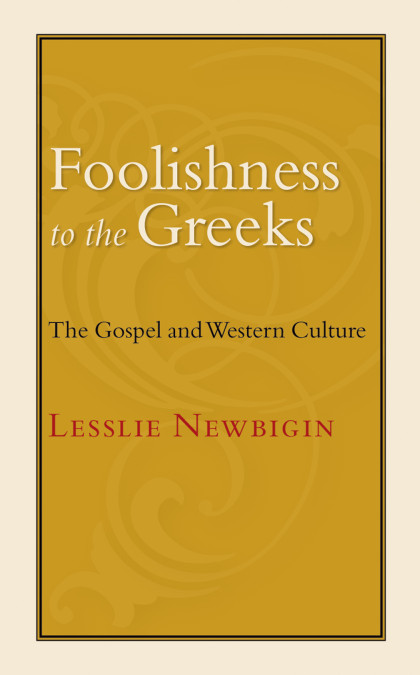As part of his Doctor of Ministry (DMin) in Ministry to Emerging Generations (Gordon-Conwell Theological Seminary), Tom’s written a number of book responses and given several short presentations (personal and group). In this series he not only “shares the wealth,” but also looks forward to your feedback as he refines his project: An argument for vocational discernment for graduate studies in the context of InterVarsity Christian Fellowship (Stay tuned to learn more!). Earlier posts on the program: Ministry to Emerging Generations and The Big Picture of Ministry to Emerging Generations.
Foolishness to the Greeks: The Gospel and Western Culture

The Gospel and Western Culture. Lesslie Newbigin (Grand Rapids, MI: William B. Eerdmans Publishing Co., 1988).
Two decades ago Lesslie Newbigin’s Foolishness to the Greeks: The Gospel and Western Culture (Grand Rapids, MI: William B. Eerdmans Publishing Co., 1988) was vital to my labors at Carnegie Mellon U. Last year I attended the Fuller Theological Seminary conference which produced The Gospel and Pluralism Today: Reassessing Lesslie Newbigin in the 21st Century (Downers Grove, IL: InterVarsity Press, 2015). When reviewing the list of supplementary texts for class, I could not resist the call to return to Foolishness to the Greeks to prayerfully consider post-Christian paganism as the most challenging missionary frontier (20).
The book’s theme remains one of my primary life concerns, “What would be involved in a missionary encounter between the gospel and this whole way of perceiving, thinking, and living that we call ‘modern Western culture’”? (1) Newbigin quickly turns to defining the important terms of contextualization, culture, language, and “the gospel.” Then he dives into “the issues raised by the cross-cultural communication of the gospel . . . the essential features of our modern Western culture . . . how biblical authority can be a reality for those who are shaped by modern Western culture . . . the encounter of the gospel with our culture with respect to the intellectual core of our culture [science and then politics] . . . the task of the church in bringing about this encounter” (4). Newbigin strikes home by stating,
With respect to ultimate beliefs, pluralism rules, and thus each individual has to make a personal decision about ultimate questions. In that sense we are all now subject to the “heretical imperative” (11).
“Chapter 2: Profile of a Culture” reminded me how often students and faculty with whom I interact embrace nature as the ultimate reality over God (27), the nation-state as the provider (27), the “doctrine of progress” (28), urbanization as the proper direction of culture (32). “Chapter 3: The Word in the World” addresses liberal interpretations of Scripture and the importance of obedience to the Jesus Christ of the Word of God, challenging the missionary to not lose sight that they are extending a “call for radical conversion,” a “paradigm shift (64). Newbigin’s engagement with science would benefit from incorporating current followers of Christ who are the sciences, e.g., Francis Collins, and their interaction with the “‘methodological atheism’ of modern science” (72). Newbigin states,
A missionary encounter with our culture must bring us face to face with the central citadel of our culture, which is the belief that is based on the immense achievements of the scientific method and, to a limited but increasing extent, embodied in our political, economic, and social practice—the belief that the real world, the reality with which we have to do, is a world to be understood in terms of efficient causes and not of final causes, a world that is not governed by an intelligible purpose, and thus a world in which the answer to the question of what is good has to be left to the private opinion of each individual and cannot be included in the body of accepted facts that control public life. . . . The twin dogmas of Incarnation and Trinity thus form the starting point for a way of understanding reality as a whole . . . at the center of this disclosure, providing the clue to the whole, there stands the cross . . . resurrection, in which that very death became the source of life” (79).
As resident aliens and agents of God’s kingdom, Christians are to extend the love of the cross of Christ, the foundation for justice (103-105, 124). We are to do such with the hope of the resurrection and the new heavens and new earth. A challenging call, but one to be embraced by each and every day in whatever vocation we have be called to in this creation.
To God be the glory!
Tom enjoys daily conversations regarding living out the Biblical Story with his wife Theresa and their four girls, around the block, at Elizabethtown Brethren in Christ Church (where he teaches adult electives and co-leads a small group), among healthcare professionals as the Northeast Regional Director for the Christian Medical & Dental Associations (CMDA), and in higher ed as a volunteer with the Emerging Scholars Network (ESN). For a number of years, the Christian Medical Society / CMDA at Penn State College of Medicine was the hub of his ministry with CMDA. Note: Tom served with InterVarsity Christian Fellowship / USA for 20+ years, including 6+ years as the Associate Director of ESN. He has written for the ESN blog from its launch in August 2008. He has studied Biology (B.S.), Higher Education (M.A.), Spiritual Direction (Certificate), Spiritual Formation (M.A.R.), Ministry to Emerging Generations (D.Min.). To God be the glory!

Leave a Reply